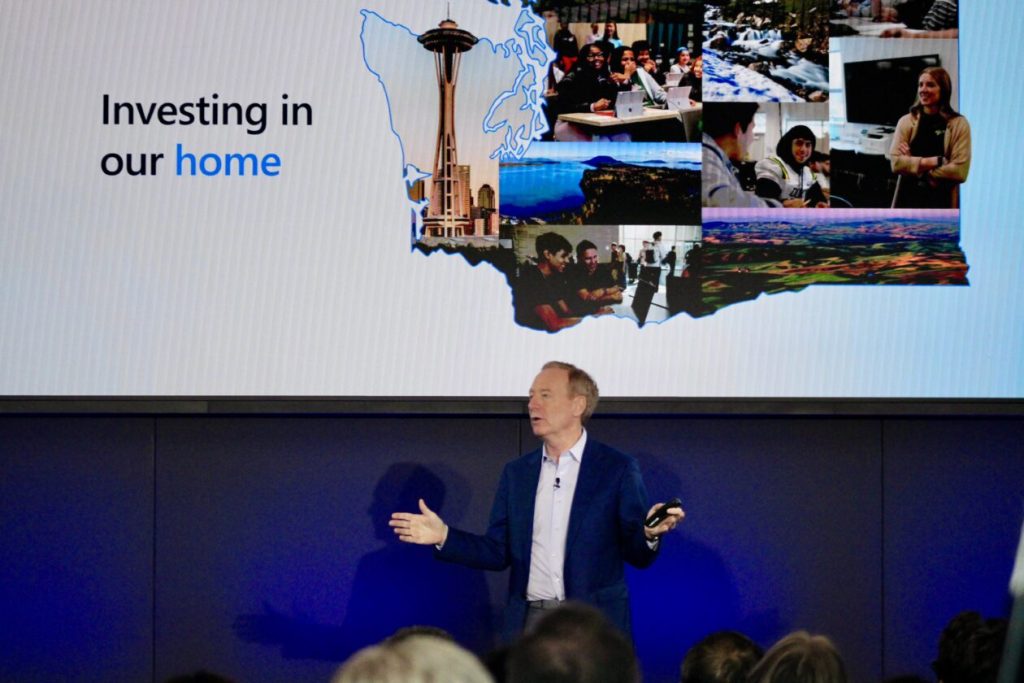The Tech Giants’ AI Embrace and Their Responsibility to Seattle
In the heart of the Pacific Northwest, a significant transformation is underway as Seattle’s tech titans Microsoft and Amazon navigate the AI revolution—with consequences that are already rippling through their workforces. Last month, Microsoft President Brad Smith unveiled an initiative providing AI software to educators and students across Washington state, a move that appears both generous and strategic against the backdrop of recent layoffs. These workforce reductions, despite varying official explanations, seem inextricably linked to both companies’ aggressive investments in artificial intelligence technologies. Microsoft has acknowledged that its layoffs directly connect to its “capital investments” in AI, while Amazon, though more circumspect, is reportedly making long-term staffing decisions with “advanced technology” in mind. This pattern reveals an uncomfortable truth: the very AI innovations these companies champion may be accelerating worker displacement, raising profound questions about corporate responsibility to the communities that helped build their empires.
The contributions of Microsoft and Amazon to the Seattle region have been undeniably significant. Their growth has generated billions in wages that flow through the local economy, supporting schools, community organizations, and charitable endeavors throughout the Puget Sound. Beyond direct employment, their success has created wealth for countless shareholders, many of whom are current or former employees whose stock options have multiplied in value over the years. As local compensation expert Matt Shaw points out, this stock market success has produced substantial benefits throughout the Seattle area. This economic ripple effect forms the foundation of one perspective: that by pursuing business success—even when that means workforce reductions—these companies ultimately serve the greater good by maintaining their competitive edge and financial health.
This libertarian viewpoint, increasingly popular in Silicon Valley discussions about AI ethics, suggests that companies acting independently in a free market produce optimal outcomes. Philosophical justification for this position can be found in Robert Nozick’s “entitlement theory,” which argues that whoever creates something, having fairly acquired the resources used in its creation, is entitled to whatever that creation is worth. Just as a star basketball player deserves higher compensation than teammates due to superior value, this thinking extends to corporations: if Amazon and Microsoft have built revolutionary businesses, they are entitled to maximize their returns without obligation to distribute their success beyond what market forces demand. Amazon appears to embrace this philosophy wholeheartedly, as evidenced by its response to Seattle’s attempts to implement new taxes on large employers—shifting employees to Bellevue and designating it as part of its “Puget Sound HQ.”
Microsoft, however, has historically positioned itself somewhat differently, at least in its public stance. Brad Smith’s “Microsoft Elevate Washington” initiative, providing free AI tools and training to public schools and community colleges, reflects what Smith describes as “investing in our home.” This language suggests acknowledgment that external communities and institutions have supported and facilitated Microsoft’s success, creating some form of reciprocal obligation. Yet even as Microsoft enjoys perhaps unprecedented profitability, questions arise about whether such initiatives are sufficient—a position recently endorsed by Seattle Mayor Bruce Harrell. When faced with state measures to increase taxes, Microsoft has pushed back through Smith’s thinly veiled threats of relocation and through significant donations to political action committees opposing such measures. This approach marks a departure from the company’s ethos under Bill Gates, who advocated for increased taxes on Washington’s wealthiest individuals and businesses.
The contrasting perspectives illuminate the fundamental question facing Seattle: what exactly should residents expect from these tech giants during this AI transition? If we accept that the public sphere in Washington—through quality education, infrastructure, and quality of life—has helped enable Microsoft and Amazon to achieve their remarkable success, then it follows that they might bear special responsibility to ensure the region continues to thrive even as AI transforms the employment landscape. Microsoft’s educational investments, while valuable, simultaneously serve its own interests by preparing future workers with skills aligned to the company’s evolving needs. A more comprehensive approach to corporate citizenship might include accepting increased taxation to fund broader social needs, particularly as AI potentially reduces traditional employment opportunities—a position most Washingtonians apparently support.
As artificial intelligence accelerates changes in how we work and live, the relationship between tech corporations and their home communities stands at a crossroads. The AI revolution promises tremendous productivity gains and new possibilities, but also threatens widespread disruption to employment patterns that have sustained middle-class prosperity. When companies like Microsoft and Amazon implement AI solutions that reduce their own workforce needs, they demonstrate in miniature what may happen across numerous industries. Their responsibility extends beyond merely offering retraining programs or making charitable donations—it includes participating constructively in the development of new social contracts appropriate to an AI-transformed economy. The question is not whether these companies should sacrifice their competitiveness or profitability, but rather how they might help ensure that the communities that enabled their rise can continue to flourish alongside them. As Seattle navigates this transition, the choices made by its tech leaders will reveal much about their vision of shared prosperity in an AI-augmented future.


